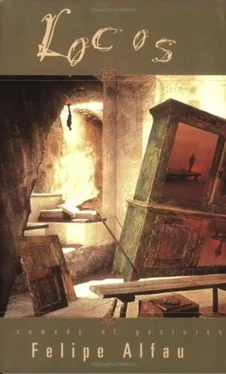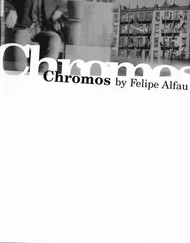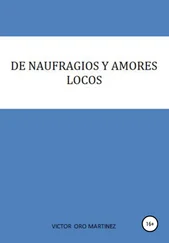“You have done right, Benito.” Don Gil was perfect. He had assumed an air of suicidal heroism which showed unsuspected histrionic prowess. “Your duty is to arrest me.”
“But, Gil, surely you have a strong alibi, even after what you said the other day about the man from China. ”
Don Gil had an alibi, of course, he had an alibi. And strange to say for a man with a good alibi, he knew in his conscience that he had not committed the crime, but the last article he had written swept his mind and the last stronghold of his human weakness.
The Prefect was watching him, he saw him thinking and all his hopes depended upon the conclusion of those thoughts. He was looking at Don Gil as if saying:
“Give the word and let us set the man from China free and not hold him responsible against all the laws of logic for a crime committed in Madrid. In such a case the theory needs correction, not the man.”
But the eyes of Don Gil had assumed a cold sternness and in them the Prefect read:
“Fingerprints never lie.”
And then Don Gil said aloud:
“Benito, let me see those photographs and my own fingerprints.”
The Prefect rushed to his desk
“Here you are. Here are the photographs and these are your fingerprints.”
Don Gil sat in the Prefect’s chair and laid both things in front of him under the green lamp. He picked up a magnifying glass from the desk and examined them closely, minutely, painstakingly, thoroughly. He laid the glass down and looked at the Prefect with a blank expression. His eyes were focused on a point in the space just before Don Benito’s nose:
“Garcia is right, these prints coincide. “ Don Gil looked again at the fingerprints and fancied that they were jumping, dancing in front of his eyes, mocking him. He was now sure that they had left the photographs and sheet of paper and had grown tiny arms and legs. Now they got hold of each other’s hands and the fingerprint dance went on. They were in space. Don Gil’s eyes followed them, they were all over the room, running through the walls, through the carpet, through the ceiling, growing, multiplying, filling the air, always dancing, mocking him. Don Gil wiped his brow and looked instinctively at his hands. The Prefect was watching him closely, curiously, Don Gil imagined pitifully, and looked into Don Benito’s eyes and saw himself reflected in them, very small. He saw in those eyes a little man that was himself, dressed in a mandarin coat and pointing accusingly at him with a fan. The vision faded, everything faded, he could not even see the Prefect clearly, everything was wrapped in a dense cloud of fingerprints that choked him. Don Gil was now absolutely aware of the rotation of the earth.
“Benito. have you an ink pad?” His voice was almost inaudible.
The Prefect opened a drawer and produced an ink pad. Don Gil pressed his fingertips on the ink pad and then on a clean sheet of paper. Again he took the magnifying glass and examined the fresh prints. His jaw dropped. Up to that moment he had hoped, now hope had abandoned him. Don Gil stood up and burst out in a jerky convulsive laughter:
“Benito. I am the man from China, I am the man from China!”
The Prefect looked puzzled, only one side of his face registered a forced smile, but the flesh quivered over the cheekbone. He laid a hand on his brother-in-law’s shoulder:
“Gil. Gil. I don’t believe you have done it. I have thought it over and now I see how ridiculous it is. Gil, think of Felisa, think of the children, think of what this is to my career. Gil, there must be a thread missing somewhere in this net of fingerprints you have woven about yourself.”
Don Gil had regained his composure. He thought of his wife and the children. He also thought of Don Benito and then he thought of his father and of the work to which he had dedicated his life, on which all his hopes of lifting his name were founded and which now threatened to sink him farther, away from mediocrity, yes, but into something worse. Was it really worse than mediocrity? And then something immense seemed to burst inside of him and of a sudden came the audible, almost plastic, realization of all the happenings of that evening. Don Gil heard the muffled voices of his son and daughter in an adjoining room, wrapped in an exasperating, mocking laughter. and also the broken exclamations of his wife. With brutal clearness he counted the ominous steps of his son, on his way out of the house. and then he heard the bang of the door like a slap in his face, and saw his wife putting cups of chocolate on the camilla with trembling hands.
At that moment Don Gil knew that his wife, left behind ignorant of this other unexpected tragedy, was consulting with Padre Inocencio and making a resolution. He knew well what that resolution meant. His brain seemed to turn a somersault and his thoughts shifted from the past to the future. He could see his daughter on her way to a convent. And then his son who had left the house for good. Again the present emerged before him with inexorable precision. He had been wrecked, his home had been wrecked, he knew that he was lost. And the two tragedies of that night clashed in his brain and once more he heard the door banged and saw and heard no more.
Don Gil had thought more than the Prefect wanted and now he disengaged himself from Don Benito’s hand and sank back into the chair.
Don Benito spoke again:
“Of course, Gil. you know it is impossible. tell me that fingerprints fail, that sometimes they lie. “
“I am the man from China. Fingerprints never lie.”
When Don Gil was formally arrested an incident took place which I do not want to pass unnoticed because of all that Don Gil put into it of himself.
Don Gil had very small hands, exaggeratedly small for any man, and the handcuffs did not fit securely enough.
Don Gil said, and I repeat it because I am sure he would have wanted the whole world to hear it, Don Gil said:
“Officer, those handcuffs are too big for me. You had better get a rope or something.”
But the officer, who was a typical officer, naturally failed in this crucial moment.
“You won’t escape,” he growled, “don’t flatter yourself.”
When Don Gil was being carried to jail, his head was shaking, perhaps only due to the jerking of the vehicle and he was repeating:
“I am the man from China. Fingerprints never fail.”
During the 19— police convention at Madrid, a very unfortunate occurrence took place. Something went wrong with the lighting system of the city and the whole metropolis was left in complete darkness.
This happening, according to the French police representative, a most accomplished sleuth for anything detrimental to Spanish people, could only take place in the twentieth century, in Spain and in Madrid. It was a most deplorable thing, for it coincided with the undesirable immigration of a regular herd of international crooks who since the beginning of the World War had migrated into Spain and now cooperated with resident crooks in a most energetic manner.
As if all these people had been waiting for that rare opportunity, the moment the lights went out in Madrid, thieves, gunmen, holdup men, pickpockets, in short all the varieties of the outlaw family, sprang up in every corner as though by enchantment.
Now, the public of Madrid has a singular quality which, although praiseworthy, is appealing. This quality enables the populace of Madrid to get together at a given notice and perform great deeds, which in the end have no effect whatsoever. And one of the manifestations of this quality is to take ready advantage of anything that may lend itself to public amusement. The Madrileños are an exceedingly communicative people and they can cooperate to the fullest extent in prolonging and amplifying a metropolitan joke.
Читать дальше












